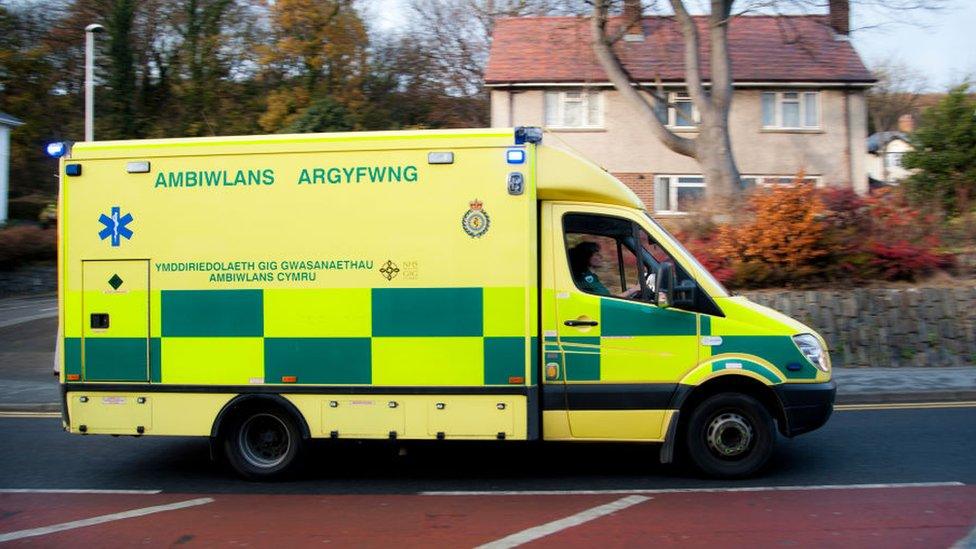Covid: Paramedic questioned job after being spat at
- Published
- comments
'I was spat at working as an ambulance paramedic'
After experiencing its most difficult period of the entire Covid-19 pandemic in December, the boss of Welsh Ambulance Service said it was still under "extreme pressure".
At one stage, 400 staff - 12% of all workers - were sick or self-isolating.
Jason Killens said this was exacerbated by high call numbers and "significant delays" handing patients to hospitals.
One paramedic described questioning whether he was in the right job after being spat at during the pandemic.
The chief executive said it meant "patients with less serious conditions waited much longer than we would like".
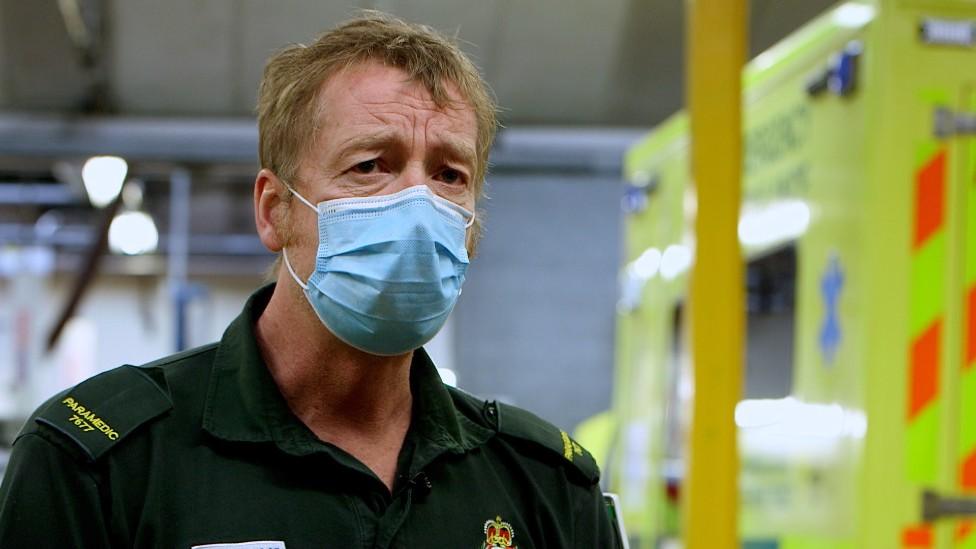
Paramedic Stan Baxter was assaulted by someone who spat at him
Paramedic Stan Baxter, describing the pressure he and colleagues were under, said at one point an incident caused him to question whether he wanted to continue working.
"During the peak of the pandemic last year, I was assaulted by a member of the public where I was spat at in the face," he said.
"And that's really the only time that I've stopped and gone: 'Is this for me?'"
However the "vast majority of the public" had been "absolutely fantastic", he stressed, adding: "We've had people waving at us, buying us coffee."
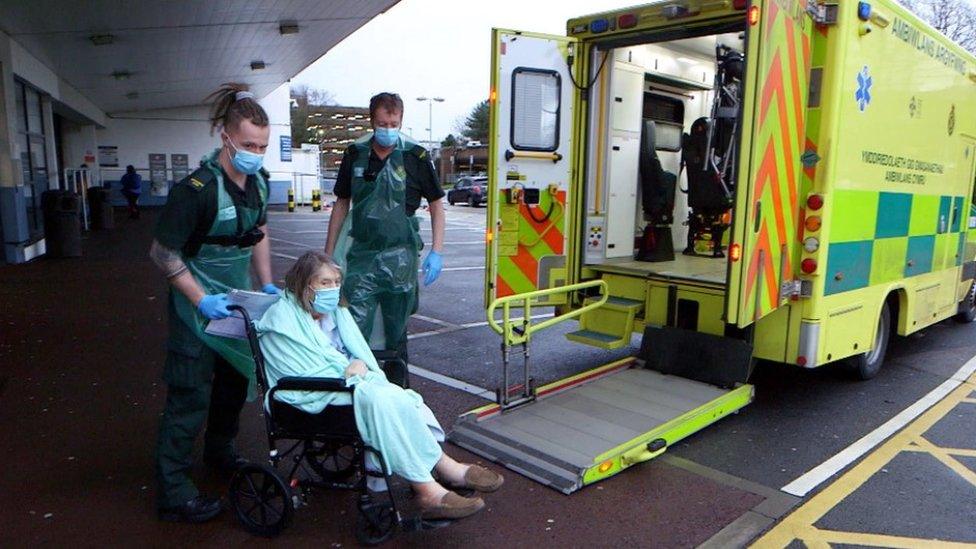
Luke Robinson and Stan Baxter must wear more protective equipment when they help patients
For his work partner, Luke Robinson, their job made it clear how coronavirus had made a resurgence across the country.
"I worked New Year's Eve and I responded to a number of incidents which involved just regular health complaints," he said.
"But next door or in the adjacent building there's people having parties and you can tell that there's large gatherings going on. And it's really frustrating because it really hammers home that some people aren't listening to the rules.
"And it's not surprising that we're seeing a second wave now."
Mr Killens said the pressure was now "palpably less" compared to last month, but admitted difficult weeks lie ahead.
"December was probably the most pressurised period during the whole pandemic for a number of reasons," he said.
"Staff that were symptomatic or isolating, that's been at its peak in December.
"We've seen more work both in the 111 and 999 service, that is patients contacting us with Covid-related symptoms, and of course because of the pressure on the rest of the NHS, we've seen extended handover at some of our emergency departments and what that's meant regrettably is some less serious patients have waited a lot longer in the community than I would have expected."
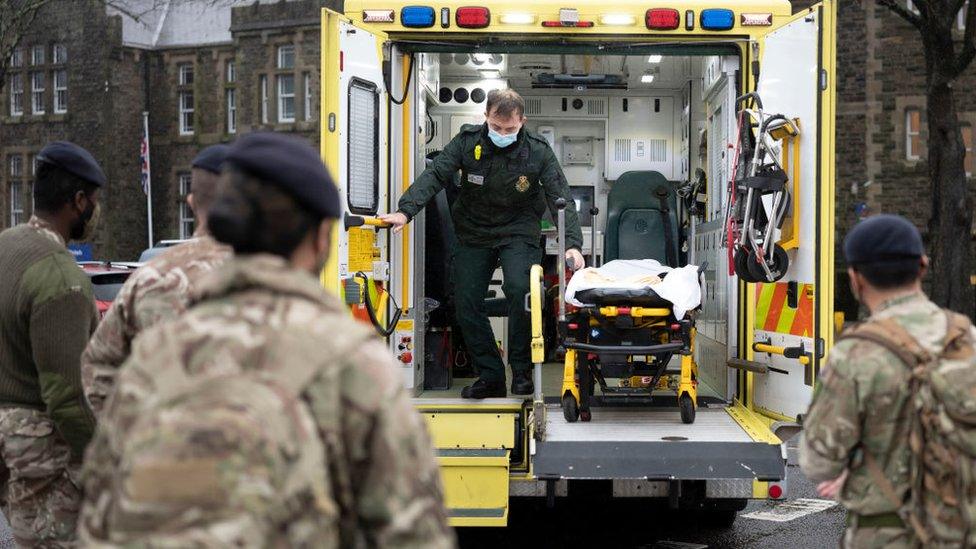
Soldiers have been helping to relieve pressure on ambulance staff
The ambulance service has been at its highest level of alert - described as "extreme pressure" - since early December.
It was so bad at the beginning of the month, the service had to declare a "critical incident", because of severe problems in south east Wales in particular - and one man had to wait 19 hours in an ambulance outside a hospital.
This strain has been partly blamed for deteriorating ambulance response times, with the situation exacerbated by the fact hospitals are struggling.
Ambulances spent more than 11,661 hours outside emergency departments waiting to transfer patients in December - an equivalent to a total of more than 485 days. The average delay was one hour and eight minutes.
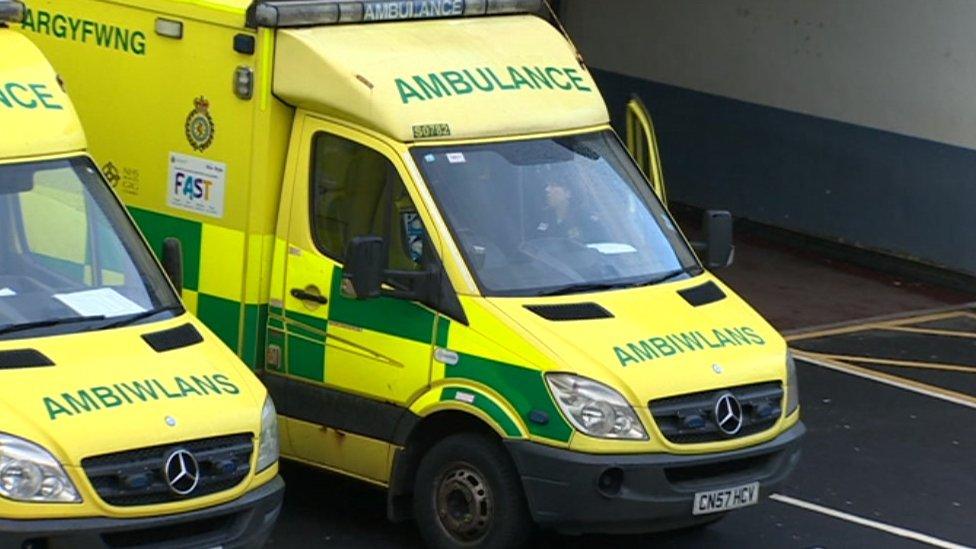
The Ambulance Service has been hit by high numbers of staff sick or self-isolating
"We would usually see handover delays through winter - but what's unique this time is the overlay of the pandemic," Mr Killens added.
"There has to be additional distancing, this means less capacity in emergency departments.
"Testing also needs to be done before patients are admitted - the additional complexities mean the process is slower and there's less space for patients to go into."
He said the impact of implementing Covid precautions is also affecting how quickly crews can respond.
"As a result of the virus, we're having to clean vehicles and equipment more frequently and thoroughly than before," Mr Killens said.
Soldiers help ambulance service on Covid 'home straight'
"Also there are levels for personal protective equipment that staff have to wear to protect themselves and others. Level three - the highest in some cases.
"And it takes a number of minutes for crews to put that on before staff treat the patients."
To bolster staffing levels and speed up response times, about 80 soldiers are assisting the Welsh Ambulance Service for the second time since the start of the pandemic - along with smaller number of staff from other services like the fire service.
"They are driving emergency ambulances for us... which means an emergency ambulance clinician can look after the patient," Mr Killens added.
"They'll drive the ambulance from the scene to hospital... it enables us to put more ambulances on the streets to respond to patients more quickly given the levels of absence that we've seen."
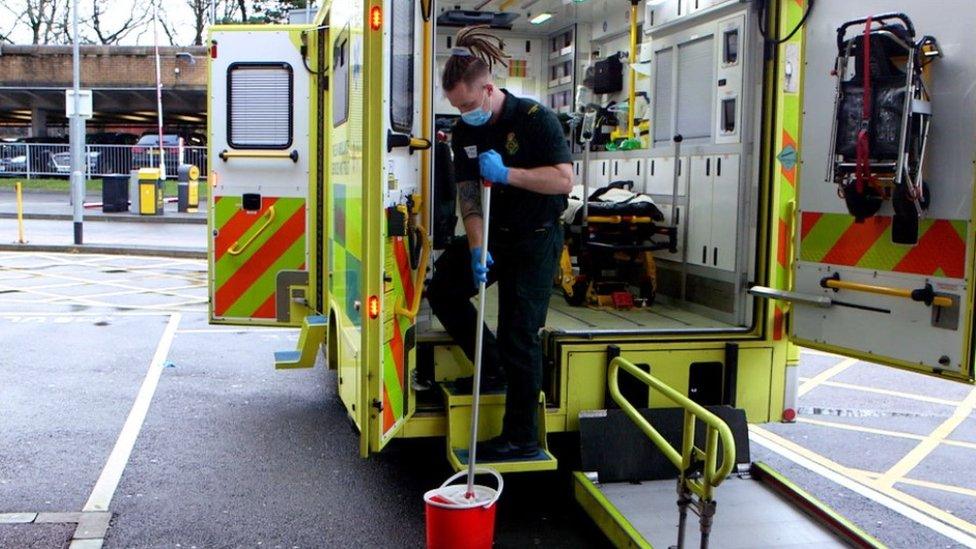
Paramedics now have to carry out a more rigorous and time-consuming cleaning regime
After facing relentless pressure for close to a year, Mr Killens is worried about the impact on mental health and well-being of ambulance and control centre staff.
The service is focused on "what we can do to keep them fit and well", he said.
But he praised staff for "stepping up to the plate" - and insists some of the lessons learnt during the last year will benefit the service during the longer term.
"I've been in the ambulance sector for 25 years and this is like dealing with a very long incident," said Mr Killens.
"So, a major incident an emergency service routinely responds to generally will be over in a couple of hours. But the level of pressure has been sustained now for 12 months.
"All of our people have stepped up and done what was necessary and got on with providing the best care in really difficult circumstances.... we will come through it and at the end of the pandemic and will be a stronger organisation for it."
'Better position in spring'
He believes the service is now "on the home straight" in dealing with the pandemic.
"We've had two waves of this virus and learnt much along the way, and with a vaccine rollout we have a real opportunity now to see an end to the disruption, the personal impact and the level of death and harm," Mr Killens said.
"By the time we get to the other side of the spring, probably we will be able to return to some kind of normality whatever that will be 18 months into a pandemic.
"There's a couple of difficult weeks to come, but if we can emerge through February and March, provided we all stick to the rules, because it's easy for the virus to grab hold again if we get complacent .... we'll be in a far better position as we come to the spring."
- Published22 December 2020

- Published3 December 2020
